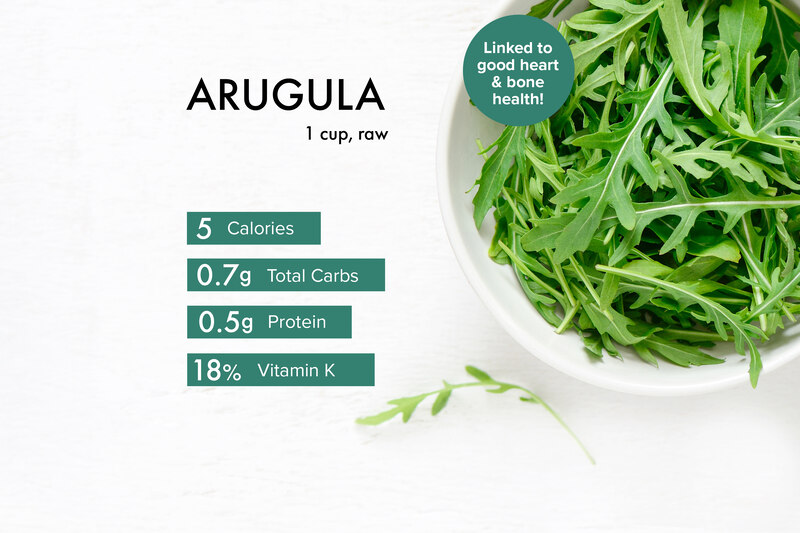Arugula, often called rocket or rucola, is a kind of leafy green vegetable from the family Brassicaceae. It's well-known for its sharp taste and it has gained recognition as being very good in terms of nutrition. In this article, we are going to talk about the different nutrients present in arugula and look into its possible health advantages.
Nutrient Profile of Arugula
Arugula contains many vitamins and minerals that are important for your health. It is high in vitamins A, C, and K. Vitamin A helps keep your eyes and immune system strong. Vitamin C works as an antioxidant to protect cells from harm while vitamin K is very important for blood clotting and keeping bones healthy.

Apart from vitamins, arugula has different kinds of minerals like calcium, magnesium, and potassium. Calcium is important for keeping bones and teeth strong while magnesium helps with muscle and nerve functions. Potassium aids in balancing fluids, sending nerve signals, and muscle movements, making it a complete option for nutritional assistance.
- High Fiber: Arugula provides dietary fiber, aiding in digestion and maintaining a healthy gut.
- Low Calorie: Despite its rich nutrient profile, arugula is low in calories, making it ideal for weight-conscious diets.
Antioxidant Properties
Arugula has strong antioxidants, which assist in battling free radicals within your body. This could decrease the chances of chronic ailments like heart disease and cancer. It also contains substances such as beta-carotene and lutein that might be related to a reduced possibility of age-related macular degeneration.
Arugula contains many other beneficial compounds besides beta-carotene and lutein. It is particularly high in phytonutrients like quercetin and kaempferol, which are known for their anti-inflammatory effects. This means that eating arugula often can be good for general cellular health and lifespan by helping to lessen problems linked with inflammation.
- Sulforaphane: Arugula contains sulforaphane, a compound known for its potential cancer-fighting properties.
- Detoxifying Agents: The presence of glucosinolates in arugula supports the body's detoxification processes.
Supports Bone Health
Arugula has plenty of vitamin K which is good for your bones. This vitamin helps in the metabolism of bone, and having enough vitamin K is linked with better bone density and less chance of getting fractures. Adding arugula to the food you eat can aid in maintaining general bone health, possibly reducing risks such as osteoporosis.
Additionally, the calcium and magnesium content in arugula adds to the strength and density of bones. Bones mainly contain calcium, while magnesium helps in turning vitamin D into its active state which aids in better absorption of calcium. This mix of substances makes arugula a beneficial food for keeping good bone health.
- Bone Formation: Arugula contains folate, which is essential for the production and maintenance of new cells, including bone cells.
- Alkaline Properties: The alkaline nature of arugula helps maintain the body's pH balance, which is crucial for bone health.
Promotes Heart Health
Including arugula in your diet may help to improve heart health. The nitrates that are present in leafy greens like arugula might assist in reducing high blood pressure levels. Also, the existence of potassium in this food aids with cardiovascular function by controlling blood pressure and lessening the chances of stroke.
Additionally, arugula has omega-3 fatty acids that are good for the heart. These can help in reducing triglycerides and decrease the chances of arrhythmias. The fiber present in arugula assists with maintaining a healthy heart by aiding in reducing cholesterol levels. Therefore, the combination of these two benefits makes it clear that including arugula in your diet is beneficial for your heart health.
- Homocysteine Levels: Folate in arugula helps lower homocysteine levels, a risk factor for cardiovascular diseases.
- Anti-inflammatory: The anti-inflammatory properties of arugula contribute to reducing the risk of atherosclerosis.
Weight Management
Arugula has few calories but many beneficial nutrients, so it's great for people who want to control weight. The high amount of fiber in arugula helps you feel full longer and lessens your hunger, stopping overeating. Adding arugula to dishes can assist with weight reduction without losing important nutrients.

Also, arugula's glycemic index is low so it doesn't affect blood sugar much. This assists in avoiding ups and downs that can cause more hunger and desires. Its nutrient compactness guarantees that even when you are on a diet with fewer calories, your body still consumes important vitamins and minerals that help to manage weight healthily.
- Metabolism Boost: Arugula contains B vitamins that support metabolic function, enhancing energy levels and fat metabolism.
- Hydration: With its high water content, arugula helps maintain hydration, which is essential for efficient metabolism and overall health.
Versatile Culinary Ingredient
In addition to its nutritional value, arugula brings a distinct taste and texture to many types of foods. It is commonly eaten raw in salads or as part of sandwiches and wraps. You can also cook it gently with some oil for a side dish or use it as a topping on pizza. The flavor of arugula is spicy, making it match nicely with citrus fruits, nuts, and cheeses among other things. This allows for infinite cooking ideas!
You can also mix arugula into smoothies or use it as a topping for soups and stews, which gives them more nutrition. Its flexibility in cooking makes it simple to include within various recipes, improving the taste and healthiness of meals without requiring too much work.
- Culinary Substitutions: Arugula can be used as a substitute for other leafy greens like spinach or lettuce in various recipes.
- Preservation: To keep arugula fresh longer, store it in the refrigerator in a plastic bag with a paper towel to absorb excess moisture.
Conclusion
To end, arugula is not just a tasty part of dishes but also full of nutrients. It has many vitamins, minerals, and antioxidants that are good for your health. Eating arugula, whether fresh or cooked, can bring lasting advantages to your body's wellness.












